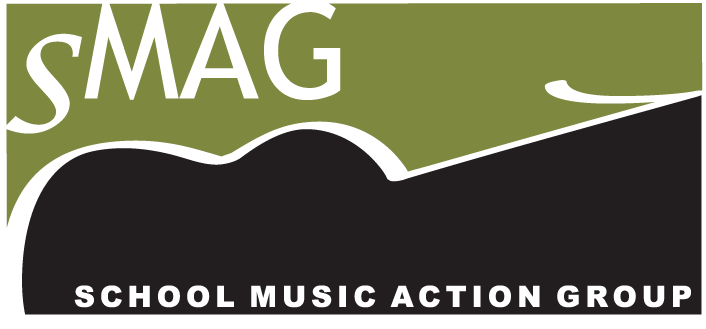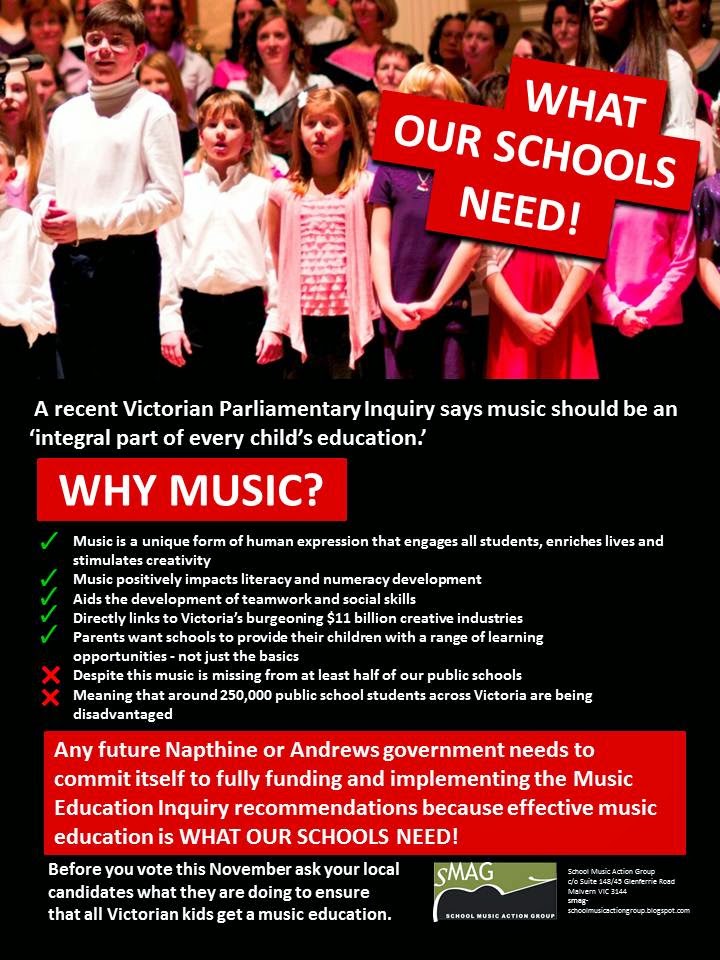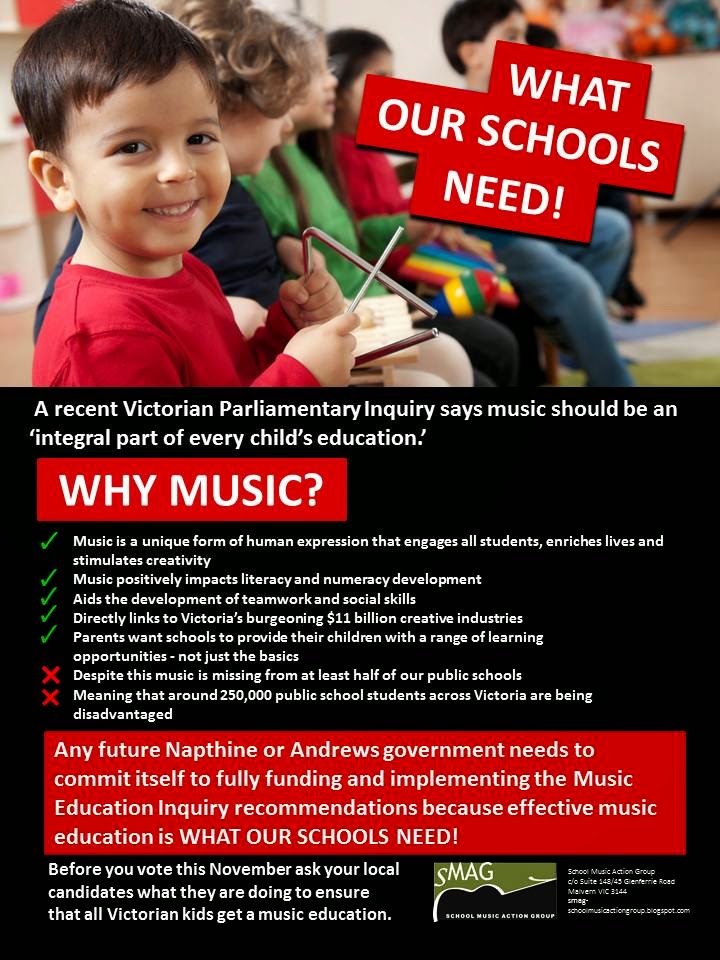The School Music Action Group (sMAG) welcomes the Final Report of
the Review of the Australian Curriculum and offers this initial response:
• sMAG applauds the Final
Report of the Review of the Australian Curriculum, and welcomes the
recommendations for change and curriculum simplification particularly around
The Arts.
• sMAG has long recognized
that the expectation for generalist primary teachers to deliver 5 Art forms in
any depth was too ambitious. Five Arts subjects amalgamated into one stream both
devalues each of the separate strains, and overcrowds the primary school
curriculum. The call for a simplification of the curriculum with 2
mandatory Arts - Music and Visual Arts - will permit a greater depth of
learning in the primary school.
• sMAG believes Music
needs to be a standalone compulsory subject in both the Australian and
Victorian curricula. Music curriculum delivered as a core Performing Arts
subject in primary schools can allow for extra curricula activities in Drama
and Dance to be supported.
• sMAG welcomes the call for a robust Australian Curriculum in
Music, that encourages aural and notional literacy, as well as the
exploration of historical works from all World cultures as these additions will
balance the current focus on music making and ATSI music, as well as address
the concerns around repetition in the cross curriculum priorities.
• sMAG welcomes the
call for re-structuring of The Arts curriculum by specialists, strengthened
with clear national standardized assessment benchmarks, and with
a greater balance between making and responding.
• sMAG welcomes and
supports a recognition that teachers of The Arts need to have specialised under
graduate training to advanced levels. We also welcome and support the
recommendation to fund ongoing PD for music specialists, particularly
around ATSI musical inheritances.
• sMAG welcomes the
recommendation that The Arts curriculum should be available to all
students throughout all the years of schooling. However, to commence
formal Music curriculum in Year 3 is not adequate. F- 2 Music
curriculum needs to be delivered as a part of the F- Year 8 core sequential
program, delivered by expertly trained Music specialists, because the research
clearly informs us that the benefits across literacy, numeracy, socialization,
spacial awareness and neurological growth is optimized in the early years of
human development.
• sMAG agrees to some
extent that 'The content of each of The Arts forms needs to be restructured and
re-sequenced along the lines suggested by the subject matter specialists. The
documents need be expressed in clearer language .' The current
hyperlinks in the document for music provide a positive foundation to this end,
which can be celebrated. Various State and Territory Curriculum
Authorities have produced good work in this area. Taking the best of each
and placing it in an Australian curriculum may be one way forward.
Considering
we now have two government reports released within 12 months of each other,
both calling for improvement in both Music curriculum (National) and Music
delivery (Victorian), sMAG calls upon all governments to respond
comprehensively with a view to implementing, strengthening and funding all the
recommendations.
Final Report Recommendations in The Arts are
quoted below:
The arts curriculum should be available
to all students throughout all the years of schooling. The learning area should
be formally introduced at Year 3 but provide a rich source of resource material
for Foundation to Year 2, the Foundation years.
The core content of all five strands
should be reduced and a considerable portion of the current core be included in
school-based curriculum and activities, thus augmenting the rich arts programs
which most schools are already conducting.
Two of the arts strands should be
mandatory and we recommend music and visual arts. The other three strands would
be elective subjects and schools would choose which to offer according to their
resources and wishes of the parents and nature of the school context. Media
arts should become a separate standalone subject and substantially reduced in
content.
Elements of the current arts
curriculum should also be integrated into other learning areas such as English,
health and physical education, history and technologies.
The content of each of the arts forms
needs to be restructured and re-sequenced along the lines suggested by the
subject matter specialists. The documents need be expressed in
clearer language .The balance between ‘making’ and ‘responding’ in
each of the strands needs to be revisited involving consultation with arts
teachers.
The considerable resourcing costs
associated with delivering the arts curriculum need greater consideration, and
professional development for teachers is needed as the years progress. It needs
to be acknowledged that arts specialists will be needed at the advanced
levels.
An analysis needs to be undertaken to
identify the extent to which the cross-curriculum priorities have produced
repetition of content in these strands, and the extent to which they have
skewed the content of all the strands, particularly away from Western and other
cultures. The cross-curriculum priorities should be integrated, but only where
appropriate, and their presence more clearly indicated.






